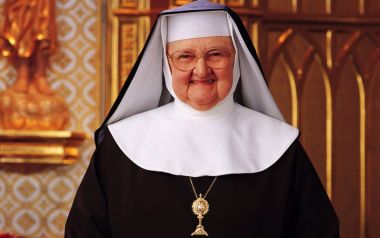Mother Angelica, America's most famous nun and founder of world's largest Catholic TV network, dies on Easter at age of 92

While Christendom celebrated the resurrection of Jesus Christ on Easter Sunday, America's most famous nun—and may be the most well-known nun in the world next only to Mother Teresa—passed away at the age of 92.
Mother Mary Angelica of the Annunciation, a Franciscan nun, founded the Eternal Word Television Network (EWTN), the world's largest satellite network, according to WND.
The cause of her death was complications from a stroke, according to a statement posted online by EWTN.
Mother Angelica launched the Catholic television network in 1981 with just $200 in her pocket, a makeshift studio in a monastery's garage in Irondale, Alabama, and one on-air personality, herself, the New York Times reported.
By the time she retired in 2001 after a series of debilitating strokes, her homespun half-hour programme of advice and commentary, "Mother Angelica Live," was the anchor of a 24-hour Catholic programming network reaching over 100 million homes in the United States, South America, Africa and Europe.
In 1995, Time magazine carried a profile article on her where she was described as "an improbable superstar of religious broadcasting and arguably the most influential Roman Catholic woman in America."
"Mother Angelica succeeded at a task the nation's bishops themselves couldn't achieve," Archbishop Charles Chaput of Philadelphia, a member of EWTN's board of governors, said in the network's statement. "She founded and grew a network that appealed to everyday Catholics, understood their needs and fed their spirits. She had a lot of help, obviously, but that was part of her genius."
In her TV programme, Mother Angelica gave the impression of a shrewd yet grandmotherly nun. She thoroughly answered viewers' questions, dispensing opinions that are sometimes at odds with Vatican policy. She lectured teens on fornication, and bishops on theology.
She excoriated feminists and other liberals whom she accused of undermining the authority of the church.
She also criticised the liberalising trends in the Catholic Church.
Her conservative views and television style attracted traditionalist Catholics who contributed generously to her enterprise, donating what The National Catholic Reporter estimated at $25 million annually in 1994.
In 2009, Pope Benedict XVI awarded her the Cross of Honor for distinguished service. It is the highest award a pope can give to a member of the laity.
Just last month she received a video message from Pope Francis, who asked her to pray for him, WND reported.
Although her health had been in decline over the last year, Mother Angelica told fellow nuns in Hanceville, Alabama, that she wanted to remain alive as long as possible.
"When I get really bad give me all the medicine I can take, all the tubes you can stuff down me. [You may ask] 'Why'd you want that?' [and my answer is] 'I want to live,'" she told the nuns.
"Why? Because I will have suffered one more day for the love of God... I will exercise you in virtue. But most of all I will know God better. You cannot measure the value of one new thought about God in your own life," she said.
Mother Angelica was born Rita Antoinette Rizzo on April 20, 1923, in Canton, Ohio, the only child of John and Mae Rizzo, according to a 2007 biography titled "Mother Angelica: The Remarkable Story of a Nun, Her Nerve, and a Network of Miracles."
Her father abandoned the family when she was 5, and she spent much of her early life plagued by a series of stomach ailments. In 1943, she claimed to have been cured by a Catholic faith healer, signalling the beginning of her interest in a religious vocation.
Mother Angelica is survived by the religious communities she founded, including the Poor Clares of Perpetual Adoration in Hanceville, Alabama, Phoenix and San Antonio; and a male religious community, the Franciscan Missionaries of the Eternal Word, in Birmingham, Alabama.











